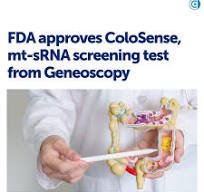Kolon kanseri erken teşhisi artık yeni invazif olmayan bir teknik olan ColoSense ile daha kolay
Kolon kanseri erken teşhisi artık yeni invazif olmayan bir teknik olan ColoSense ile daha kolay
Kolon (Bağırsak) kanseri tüm dünyada olduğu gibi ülkemizde en sık görülen ilk üç kanser arasındadır. Özelikle kentleşmenin artması, hazır ve raf ömrü uzun gıdaların tüketiminin artması ile artık daha genç yaşlarda görülme oranı artmaktadır.
Ailesel riski, ya da kolon kanseri riskini artıran Lynch sendromu, polipozis koli gibi sendromu olmayan ortalama riskli bir bireyin 45 ya ve üstünde tarama amacı ile kolonoskopi yapması, tüm ulusal ve uluslararası kılavuzlarda önerilmektedir.
Kolonoskopi ile erken teşhis ve hastalığa bağlı ölüm oranları önemli oranda azaltılmaktadır.
Kolonoskopinin yaygın olmaması, invazif ve zahmetli bir tarama aracı olması nedeniyle maalesef kolon kanserine karşı yeterli tarama yapılamamakta ve hastalığa bağlı ölüm azalmaktadır.
Daha önce gaitada gizli kan ya da büyük abdeste hemoglobine karşı geliştirilmiş fecal immunochemical test ile invazif olmayan tarama yöntemleri mevcuttu. Bu tarama yöntemlerinin kolonoskopiye göre sensitivitesi ve spesifitesinin düşük olması en büyük handikaptı.
Yeni bir test olan ColoSense gaitada hedeflenmiş multiple RNA hedeflerine odaklanarak, basit bir gaita testi ile kanser ve erken kanser lezyonlarını büyük bir kesinlikte tespit etmektedir.
Kolan kanseri genel olarak adenom ile başlayan süreç ortalama 10 yıl içinde kanser ile sonuçlanır. Bu süreçte rol oynayan beli başlı genler mevcuttur. ColoSense kolon kanseri adenom ve kanser gelişiminde önemli rol oynayan bu 7 genin (ACY1, AREG, CDH1, EGLN2, KRAS, SMAD4, TNFRSF10B) izlerini gaitada saptayarak, bu testi yapan bireylerde adenom ya da kanser olup olmadığını büyük doğrulukla söyleyebilmektedir.
Kolon kanseri tespit etmede doğruluk kolonoskopi ile karşılaştırıldığında %93 oranındadır. Bu oran non-invazif testler içinde kolonoskopiye en yakın orandır. Bu test ayrıca kolon kanseri öncesi ilerlemiş edenomları belirleme oranı %45 oranındadır.
ColoSense yaptıran bireylerde test sonucu normal gelmesi durumda, bireylere kolonoskopi yaptırıldığında %88 oranında herhangi bir patoloji(adenom/kanser) olmadığı görüldü.
Sonuç olarak dışkıda adenom ve kanser gelişiminde rol oynayan genlerin izlerini arayan yeni bir invazif olmayan test olan ColoSense ile daha hızlı ve daha yüksek oranda kolon kanseri için tarama yapılabilir.
Bu veriler ışığında, Amerika Birleşik Devletleri Gıda ve İlaç Dairesi (FDA), 45 yaş ve üstü normal risk altındaki bireylerde ColoSense kolon kanseri için tanısal test olarak onayladı.
Kaynaklar
The FDA has approved ColoSense™, a noninvasive, multi-target stool RNA screening test, for use in adults at least 45 years of age who are at average risk of developing colorectal cancer (CRC).1
The regulatory decision was supported by data from the phase 3 CRC-PREVENT trial (NCT04739722), in which ColoSense exhibited a 93% sensitivity for detecting CRC and identified 100% of stage I CRC. Additionally, the screening test detected 45% of advanced adenomas (AAs). In patients between 45 and 49 years of age, the CRC and AA sensitivities were 100% and 44%, respectively.
“Securing FDA approval for ColoSense marks a significant milestone for Geneoscopy and demonstrates that our patented RNA technology can provide millions of eligible adults with a safe and effective option for detecting CRC and advanced adenomas,” Andrew Barnell, chief executive officer and co-founder of Geneoscopy, stated in a news release. “This achievement is a testament to our deep dedication and commitment to bringing innovative technology to market that will improve outcomes for this deadly, yet preventable, disease.”
ColoSense is designed for the detection of colorectal neoplasia–associated RNA markers and occult hemoglobin in human stool. A positive ColoSense result could indicate the presence of CRC, AAs, or serrated precancerous lesions, and patients with a positive result should receive a subsequent colonoscopy.
Previously reported data from CRC-PREVENT published in The Journal of the American Medical Association showed that among 8920 eligible study participants, 0.40% had CRC and 6.8% had AAs. ColoSense displayed a sensitivity of 94% for detecting CRC, a 46% sensitivity for detecting AAs, and an 88% specificity for no lesions on colonoscopy. Furthermore, ColoSense demonstrated an improved sensitivity for CRC (94% vs 78%; McNemar P = .01) and AAs (46% vs 29%; McNemar P < .001) vs a commercially available fecal immunochemical test (FIT).2
Using social media platforms, the study enrolled patients from June 2021 to June 2022 via a decentralized nurse call center. Male or female participants needed to be greater than 45 years of age and willing to provide stool samples within 120 days before a colonoscopy.3
The study excluded participants who had any precancerous findings on their most recent colonoscopy; had a history or diagnosis of CRC; had a history of aerodigestive tract cancer; had a colonoscopy in the previous 9 years; and had a diagnosis or personal history of high-risk conditions for CRC.
All participants completed the multi-target RNA test, which included a commercially available FIT, a concentration of 8 RNA transcripts, and participant-reported smoking status. After stool samples were collected, participants underwent a colonoscopy at their local endoscopy center. The ColoSense test results were compared with index lesions observed on colonoscopy.2
The primary objectives of the study were the sensitivity of ColoSense for detecting CRC and AAs, as well as the specificity for detecting no lesions on colonoscopy.
Enrolled participants had a mean age of 55 years (range, 45-90). Notably, 4% of participants self-identified as Asian, 11% identified as Black, and 7% identified as Hispanic.
“The growing number of adults diagnosed with CRC underscores the urgent need for innovative approaches in screening. It’s essential to eliminate obstacles and broaden the availability of screening methods for healthcare providers and patients,” Anjee Davis, president of Fight CRC, added in a news release.1 “We hope that introducing new FDA-approved diagnostic tools, including stool-based tests like ColoSense, will help to advance access and increase screening rates, ultimately reducing the impact of late-stage colorectal cancer diagnoses.”
References
FDA approves ColoSense™ – Geneoscopy’s noninvasive multi-target stool RNA (mt-sRNA) colorectal cancer screening test. News release. Geneoscopy. May 6, 2024. Accessed May 7, 2024. https://www.geneoscopy.com/fda-approves-colosense-geneoscopys-noninvasive-multi-target-stool-rna-mtrna-colorectal-cancer-screening-test/
Barnell EK, Wurtzler EM, La Rocca J, et al. Multitarget Stool RNA Test for Colorectal Cancer Screening. JAMA. 2023;330(18):1760-1768. doi:10.1001/jama.2023.22231
Colorectal cancer and pre-cancerous adenoma non-invasive detection test study (CRC-PREVENT). ClinicalTrials.gov. Updated May 15, 2023. Accessed May 7, 2024. https://clinicaltrials.gov/study/NCT04739722

